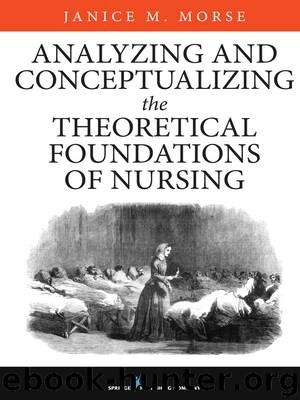Analyzing and Conceptualizing the Theoretical Foundations of Nursing by Janice M. Morse PhD (Nurs) PhD (Anthro) FCAHS FAAN

Author:Janice M. Morse, PhD (Nurs), PhD (Anthro), FCAHS, FAAN
Language: eng
Format: epub
Publisher: Springer Publishing Company, Inc.
Published: 2016-08-23T04:30:00+00:00
CONCEPTUAL DEVELOPMENT: THE MATURITY OF THE THEORY
The level of analysis achieved by the investigator before developing the theory schematically will determine the quality or level of maturity of the theory. If the researcher does not develop concepts within the theory, the theory will remain low level, particular to the context from which it was developed (and therefore not generalizable). Therefore, good mid-range theory must have the following characteristics.
The Concepts Must Be Developed to Fit in With Current Literature
“Fitting” into the literature means that the concept labels are not “emic” labels, but the researcher has taken time to compare the emerging concepts with those already published in the literature, and has made a case for adopting (or for not adopting) the concept labels that are currently used in nursing or other social sciences. For instance, does the coping that you are seeing in your data and developing concept fit the definitions and descriptions of coping in the literature? Why or why not? If it does, then adopt the labels presently used. Not everything you identify in your study will be unique or new. Keeping your own (or the participant’s) labels will result in too many labels for the same concept, and result in “theoretical congestion” (Morse, 2000)—researchers will not find your work when they search the literature, and your work will fall into oblivion, and the results will become cluttered with so many studies describing the same thing; we will all die of fatigue trying to sort it out, or it will be used as a blade of grass in the fodder used in a meta-analysis. Any of these routes are less desirable for you: the strength of your contribution in your mid-range theory in the whole, as well as the particular.
The Descriptive Fit of Your Mid-Range Theory With Your Own and Multiple Contexts
Your theory must enlighten, surprise, and yet make sense to those who are familiar with your setting. It seems contradictory that they must, at the same time, recognize yet be enlightened by the theory. They will say, “Ah, yes! So that is what is going on!” Others must be both able to recognize the conceptual organization or the processes depicted and see the potential of your work. In this way the familiar is reorganized as a “new” insight.
The Utility of Your Theory
Usually a standard criterion of theory is to predict. This criterion may or may not be pertinent for qualitatively derived mid-range theory. It will be pertinent, if for instance, with a theory of comforting, by explaining comforting processes, predicts how comfort is attained: It is predictive. On the other hand, if the theory explains and makes sense of suffering, it does not necessarily predict the outcome of suffering for any one individual, but by illustrating and making sense of the processes of suffering, clinicians will be able to also understand the process, categorize individuals they see, and move toward identifying appropriate interventions.
Clarity, Parsimony, and Scope
Other criteria used to evaluate all theories pertain to their description and presentation. You must be clear—brief and succinct.
Download
This site does not store any files on its server. We only index and link to content provided by other sites. Please contact the content providers to delete copyright contents if any and email us, we'll remove relevant links or contents immediately.
| Administration & Medicine Economics | Allied Health Professions |
| Basic Sciences | Dentistry |
| History | Medical Informatics |
| Medicine | Nursing |
| Pharmacology | Psychology |
| Research | Veterinary Medicine |
The Daughter's Return by The Daughter's Return(1795)
1610396766 (N) by Jo Ann Jenkins(1673)
Elizabeth Is Missing by Emma Healey(1662)
Economics and Financial Management for Nurses and Nurse Leaders, Third Edition by Susan J. Penner RN MN MPA DrPH CNL(1517)
McGraw-Hill Nurses Drug Handbook by Patricia Schull(1500)
Home. by Sarah Graham(1430)
Cherry Ames Boxed Set, Books 1 - 4 by Helen Wells(1430)
NCLEX-RN Prep Plus 2019 by Kaplan Nursing(1408)
The Language of Kindness by Christie Watson(1385)
Spiritual Midwifery by Ina May Gaskin(1374)
Cherry Ames, Student Nurse by Helen Wells(1371)
NCLEX-RN Prep 2019 by Kaplan Nursing(1358)
Cherry Ames Boxed Set, Books 5 - 8 by Helen Wells(1353)
Whoever Tells the Best Story Wins: How to Use Your Own Stories to Communicate with Power and Impact by Annette Simmons(1298)
Cracking the Nursing Interview by Jim Keogh(1296)
1476763445 by Liz Fenton(1263)
Global Diversity Management by Unknown(1250)
Getting Started with Arduino by Massimo Banzi(1231)
Dementia by June Andrews(1211)
